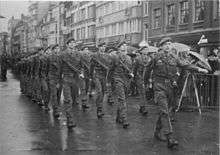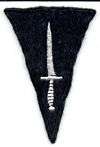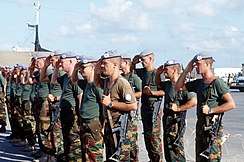3rd Parachute Battalion (Belgium)
The 3rd Parachute Battalion (French: 3ème Bataillon Parachutiste, Dutch: 3 Bataljon Parachutisten) is a military formation of the Belgian Armed Forces and part of the Special Operations Regiment. It carries on the regimental traditions of the Belgian Korean War volunteers.
| Belgian United Nations Command (1950-1955) 3rd Paracommando Battalion (1955-1959) 3rd Parachute Battalion (1959-) | |
|---|---|
 Soldiers from the 3rd Parachute Battalion parade in Kortrijk, 1971. | |
| Active | 1950- |
| Country | |
| Branch | Land Component |
| Type | Airborne light infantry |
| Role | Air Assault; amphibious warfare |
| Part of | 'Special Operations Regiment' |
| Garrison/HQ | Tielen |
| Motto(s) | "Belgium" |
| Engagements | Korean War Congo Crisis Lebanon War in Afghanistan |
| Insignia | |
| Parachute Qualification Brevet | |
| Commando Qualification Brevet |  |
Corps of Volunteers for Korea
After the outbreak of the Korean War in 1950, the United Nations asked the Belgian government for military assistance. Belgium, conscious of the vast cost and logistical difficulties of sending large numbers of men or equipment across the world, elected to put an elite unit under UN command.[1] Since the Belgian constitution forbade sending anyone but volunteers on overseas deployments in peacetime, it was not possible to send an existing battalion, so the Belgian United Nations Command (known as BUNC) was created. BUNC also incorporated a platoon of volunteer from Luxembourg. BUNC soldiers wore Brown Berets with a new cap badge to distinguish them from other Belgian units.
BUNC fought in several of the key engagements of the Korean War from 1951, including the Battle of the Imjin River, the Battle of Haktang-ni and the Battle of Chatkol. BUNC won Presidential Unit Citation (United States) and Presidential Unit Citation (Republic of Korea) for its heroism and citations for these battles are included on the Regimental Standard. Of the 3,000 Belgian soldiers who served in Korea, over 100 were killed in action between the battalion's arrival in 1951 and the 1953 armistice.[1] The last Belgian forces left Korea in 1955.
Organization
The 3rd Staff and Services Company is responsible for administration, logistics, reinforcement and support for the other company's, with: Alpha Staff Platoon (the company staff), Bravo Supply Platoon, Charlie Maintenance Platoon (maintenance of the material), Delta Logistics Platoon (kitchen, warehouses, offices, workshops or military shuttle service), Echo Transmissions Platoon. Another three support units are under the command of the battalion's commander: Foxtrot Reconnaissance Platoon (scout element), Golf 4"2 Mortar Fire Platoon (fire support element), and a Sniper Detachment (sniper element).
The three paratroopers companies consist of: Alpha Staff Platoon (the company staff), two to three Bravo, Charlie or/and Delta platoons, with a task force organization: or/a rifle platoons, or/a infantry platoons and or/a anti-tank platoons.
Major Operations
Congo
Afghanistan
Peacekeeping
Somalia

In December 1992, 1st Parachute Battalion deployed to Somalia as part of US-led United Nations mission Operation Restore Hope. Their role involved protecting UN aid distribution, as well as searching out militants. The 3rd Parachute Battalion was later also deployed to the country.
In 1993, two soldiers of the 3rd Parachute Battalion were arrested, after a photo apparently showing two soldiers holding a Somali boy above a fire appeared in Belgian newspapers.[2] Two soldiers were put on trial in Belgium, but both were acquitted by a military tribunal through lack of evidence.[3]
Lebanon
Soldiers from 3rd Parachute Battalion have been deployed to peace-keep in Lebanon as part of the United Nations UNIFIL mission. The Belgian force, known as BELUBAT (since it is also joint with Luxembourg).
Composition
The battalion was bilingual (French-Dutch) from its creation until 1982, but is now Dutch speaking only.
The 3rd Paratrooper Battalion and the 2nd Commando Battalion personnel are all trained identically, and are designated as a Paracommando on completion of their training, Personnel allocated to the 3rd Paratrooper Battalion are awarded the Paratroopers Maroon Beret, and wear the Parachute Qualification Brevet above the right side chest Pocket along with Belgian "Commando Dagger" brevet on the upper right sleeve
See also
- King Philippe, a member of the battalion in 1983.
References
- Bud, Guy. "Belgians and the Korean War". Archived from the original on 2014-12-13. Retrieved 24 November 2012.
- "Good intentions turned to shame". The Economist. Jul 3, 1997. Retrieved 24 November 2012.
- Ammerlaan, Nieck (June 30, 1997). "Belgian soldiers acquitted in Somalia trial". Reuters. Retrieved 24 November 2012.
External links
- "3 Bataljon Parachutisten" (in Dutch). www.mil.be. Retrieved 19 November 2012.